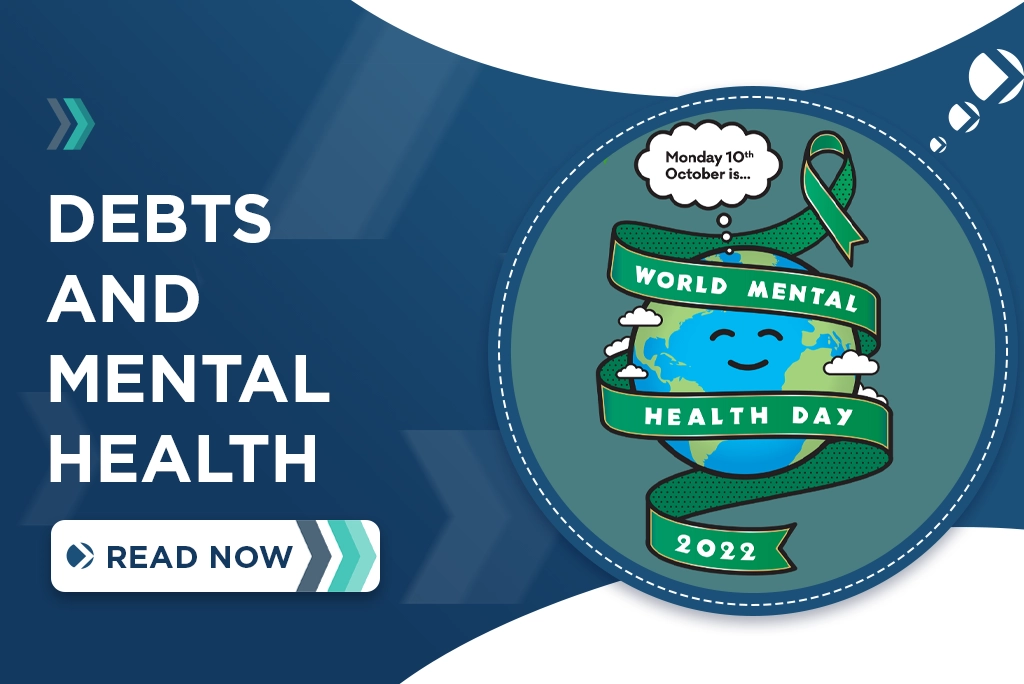
The Importance of Debts and Mental Health
10th October 2022
Does someone owe you money? Do you owe money to someone? There is a link between debts and mental health, and as such, we have produced this helpful guide for those struggling.
Mental Health and Debt Advice – Contents
- How Debt Affects Mental Health
- The Mental Health of Creditors
- The Mental Health of Debtors
- Mental Health Helplines
Mental Health Awareness Day comes around every year to raise awareness for the genuine and pressing issue that many people face daily. It is no secret that mental health conditions, such as anxiety and depression, arise in all areas of life.
According to mind.org, approximately 1 in 4 people will experience a mental health problem each year in the UK.
Mental illness affects everyone, regardless of age, gender, race, or ethnicity, which is why it is such an important topic to discuss.
Continue reading to see why, in certain situations, debts and mental health have a connection.
How Debt Affects Mental Health
From the type of conversations that can be had, money is undoubtedly one of the most sensitive. So much so, even discussing this with family members or close friends can instil anxiety or uneasiness.
Taking this into account, it is no wonder why money and mental health have such a connection, especially in relation to debts.
There are many reasons why people may get into debt, with living excessive lifestyles, unemployment and redundancy being the top contributors.
With the increasing cost of living, the rise of interest rates and the need for credit cards getting higher, this is bound to result in financial difficulty.
For individuals, this could result in a financial situation where they fail to upkeep payments.
If this happens, both the party that owes the money (the debtor) and the party it is owed to (the creditor) are affected.
When it comes to debts and mental health, we need to take into account the well-being of both the creditor and the debtor.
The Mental Health of Creditors
It is a reality that when you lend someone money, you expect this to be paid back to you within the agreed timescale.
After all, you have entrusted them to pay you back and have been nice enough to lend them the money in the first place.
On the other hand, you may have provided a service to a customer that has failed to pay you back for whatever reason.
Either way, if you are left without money that is rightfully yours, this can undoubtedly form a lot of stress and unwanted anxiety.
Small businesses that are not paid by their customers may face financial stress in the form of not being able to pay their own bills.
This could result in the business having to file for bankruptcy, which can have an extremely negative effect on the owner’s mental health.
DCBL has adapted its debt recovery processes to ensure creditors receive the most peaceful service possible.
Our clients are provided with a variety of options when it comes to collecting their debts. This helps to speed up the process of getting their money back efficiently, without taking them away from their day-to-day life.
To ensure there is no radio silence throughout the debt recovery process, we ensure to keep our clients informed every step of the way. Lack of communication is known to produce more anxiety which is why we aim to reduce this where possible.
We ensure that relationships between the creditor and the debtor are not jeopardised, meaning future business can be carried out should you allow it to.
The Mental Health of Debtors
Commonly there are two types of debtors, those who have no intention of paying or those who cannot pay.
Those who have no intentions to pay are less likely to feel the mental strain of this than those who cannot pay for whatever reason.
In recent years, it has become increasingly easier to get into credit card debt, especially with overzealous spending.
As a business, DCBL provides many options to help to support the debtor with repaying what they owe.
Our large communication centre operatives are specially trained to help those struggling during the debt recovery process.
The core business strategies are based on ethical approaches, focusing on the welfare of both creditors and debtors to resolve the recovery amicably.
Payment plans are discussed with debtors to help them pay the debt back in a way that is convenient to them, whilst not affecting their monthly income.
Whilst we have a duty to recover the debt, the way we operate allows us to achieve a successful recovery whilst mitigating the risk of affecting the debtor’s mental health.
Mental Health Helplines
Struggling with your mental health? Don’t be afraid to speak to someone at one of the below helplines.
ReThink Mental Illness:
Call: 0300 5000 927
Visit: www.rethink.org
Mind:
Call: 0300 123 3393
Visit: https://www.mind.org.uk/
Samaritans:
Call: 116 123
Visit: www.samaritans.org/
Calm:
Call: 0800 58 58 58
Visit: www.thecalmzone.net









